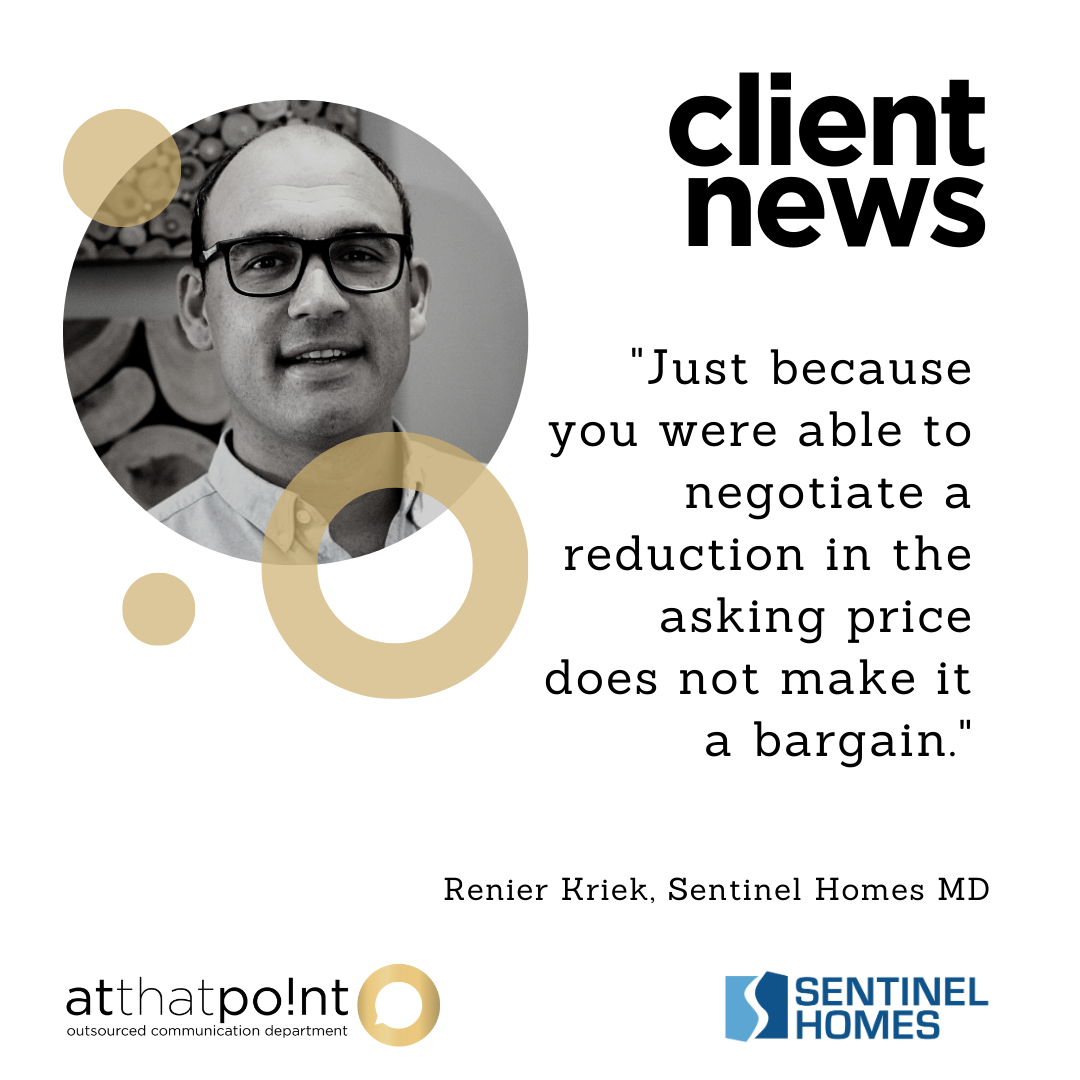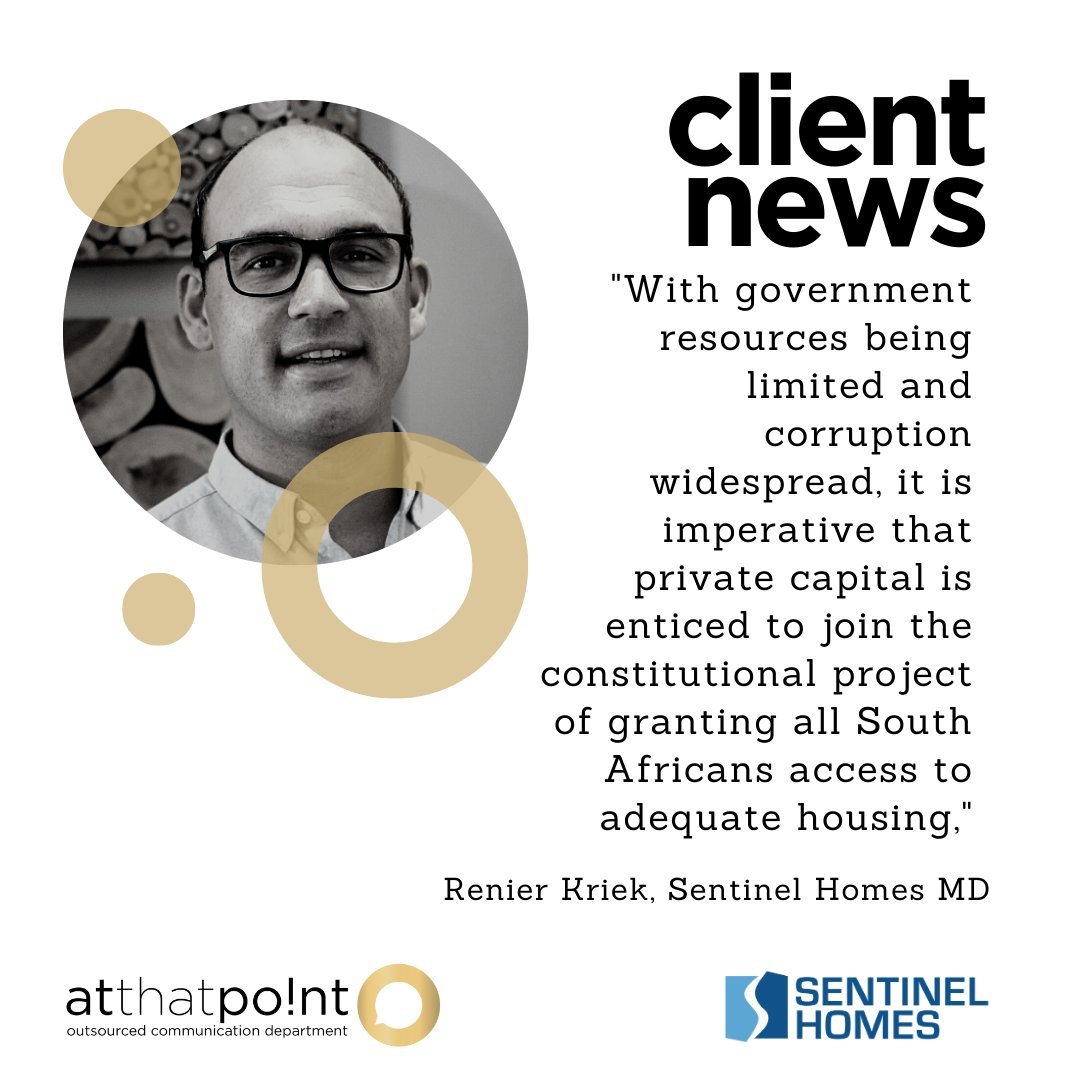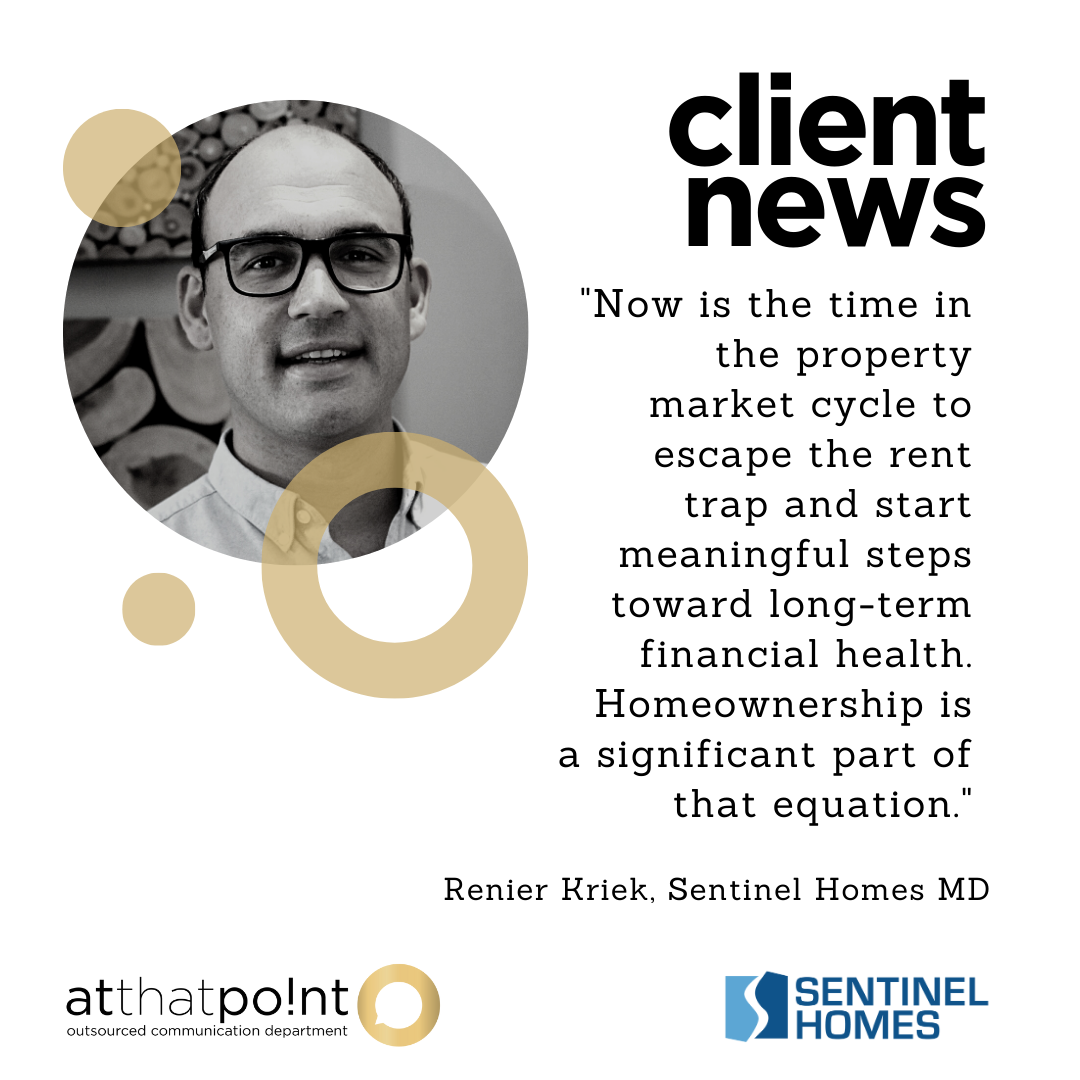|
The single woman’s guide to buying their first home
Almost 60% of South African homes are owned or co-owned by women, and women are increasingly buying property without a spouse or partner. “Many will be first-time buyers who are hesitant to commit because they feel they are unable to afford such an investment,” says Renier Kriek, Managing Director at Sentinel Homes. As someone who deals with single or unmarried property seekers regularly, Kriek offers some good advice to help you find the best way to finance your purchase. Rise of the female homeowner As modern family dynamics change, one demographic indicates that more than 40% of South African children now live with their mother only. This is greater than the number residing with both parents or another related adult. “Traditionally,it is believed that homeownership is one way to create the stable and secure setting that is conducive to childrearing. This cultural attitude, coupled with demographic changes, may explain the surge in women buyers,” says Kriek. Yet, buying a property on a sole income can be daunting for anyone, regardless of gender, especially since property prices have risen faster than salaries over the past 70 years. However, Kriek warns that once the practical results of the election have become clear and the long-anticipated interest rates cut has arrived, pent up demand will surely unleash a buying spree that sends property prices skyrocketing. Buying now, before the market rises, is probably preferable to buy now, especially for those buyers who must stand on their toes to buy a property in the first place, such as single men and women who only have the benefit of one income. “With the current buyer’s market, it is the ideal time to invest in a home that’s still affordable,” he says. Buying a home on a solo budget To find the best property, you first need to decide how you will pay for it. Here are some great tips to consider: Your primary concern is how much you can get together for your investment. This starts with an honest assessment of your financial position and credit record, since you will likely need to apply for a bond, which may require a substantial deposit. Then, do your research to discover alternative financing solutions. For example, the government’s First Home Finance subsidy offers qualifying applicants free financing that can be combined with other housing products, like mortgage loans. The options are out there, you just need to find them. However, don’t be tempted by shady loans that make getting into debt easy but whose crushing rates will eventually leave you penniless - and maybe even homeless. Next, implement sensible lifestyle changes. Now is a good time to start paying off lesser debts to free up disposable income and improve your credit rating. Also ask yourself which expenses you’re willing to live without, like your Netflix subscription or weekend takeaways. It all adds up. Ask your employer if they provide assistance with property purchases. For instance, some banks may offer certain staff home loans with low or no deposit, and some employers may offer formal or informal programs of assistance to those who wish to buy. Most importantly, be aware that every property comes with initial and monthly costs, some obvious and some hidden. Upfront, you’ll face transfer and registration fees, and transfer duty. Then, there are the ongoing and adhoc costs, such municipal costs, sectional title levies and consumption costs. You are also responsible for home maintenance and repairs, and other infrequent expenses that don’t normally affect renters. Make sure you work these into your calculations. Getting value from property Now, consider the best type of property to buy. Most single people prefer a lock-up-and-go home, like a property in a sectional title complex. Currently, sectional titles make up more than half of the properties in the country due to their excellent value-for-money proposition. For instance, they allow you to enjoy many of the benefits of a free-standing property, albeit in a communal setting. The cost of security, gardening, property maintenance, a swimming pool and entertainment areas, and more, is shared among owners, making these amenities affordable and accessible to each. “Given the demand, this is also the easiest property to sell when your lifestyle needs change, again making it the best for a first-time owner,” says Kriek. If your employer is open to you working remotely, or you can run your own business remotely, you may find better value in rural areas or the countryside. In such regions, your bond might be cheaper than your current rental, so keep an open mind. Also, determine if the property could somehow pay for itself. A granny flat or spare room that can be rented out for additional income certainly helps to ease bond repayments. Lastly, buy with the end in mind. One day, you may want to sell your starter home for the highest price you can get. To ensure its value keeps pace with the market, look at the basics most buyers demand, such as its proximity to schools, shops, hospitals, daycare and similar amenities. Also, try not to buy property in declining areas – low prices may in fact be a value trap. The rewards of due diligence As a single woman, who may also be a mother, your first home might seem like a distant dream, but it could be more affordable than you think. “As long as you are willing to do your homework, you might be surprised at what is possible and how soon you can have what you want,” says Kriek. ENDS MEDIA CONTACT: Rosa-Mari Le Roux, [email protected], 060 995 6277, www.atthatpoint.co.za For more information on Sentinel Homes please visit: Website: www.sentinelhomes.co.za Facebook: Sentinel Homes
0 Comments
 Everyone buying a home would like to know that they are getting good value for money. Buying a property that is good value for money is not easy but is achievable for those who are astute and are willing to be patient and remove as much emotion from the decision as possible. The first important mindset shift is that buyers must not confuse value with price. “Just because you were able to negotiate a reduction in the asking price does not make it a bargain. The price likely was inflated to begin with, because there are many incentives favouring higher listing prices,” says Renier Kriek, Managing Director of Sentinel Homes. True bargains have some distinguishing characteristics to look out for. This includes:
Home seekers on the lookout for a bargain must remain alive to illegal construction. “The risk associated with illegal building work is almost always not worth the discount on the price,” says Kriek. If there are any doubts about the structural integrity of a building, call in the professionals to do an inspection. The benefit of a qualified home inspector, especially to inexperienced buyers, cannot be overstated. Since kitchens and bathrooms are the most expensive parts of any residential properties carefully consider the conditions of these two areas. More sage advice from Kriek is to avoid bargains close to open public spaces. These areas tend to devalue property if they are not well maintained by local authorities. ENDS MEDIA CONTACT: Rosa-Mari Le Roux, [email protected], 060 995 6277, www.atthatpoint.co.za For more information on Sentinel Homes please visit: Website: www.sentinelhomes.co.za Facebook: Sentinel Homes If you do not want to receive emails from us, please use the link: Click here to unsubscribe.  Overregulation of the housing market in South Africa is discouraging the private sector from investing in formal low-cost housing projects. This is according to Renier Kriek, Managing Director at Sentinel Homes. "With government resources being limited and corruption widespread, it is imperative that private capital is enticed to join the constitutional project of granting all South Africans access to adequate housing," he says. It is apparent that, for all the government's initiatives, programmes and subsidies to provide RDP housing, a vast number of underprivileged citizens still reside in informal settlements. However, while tax breaks exist for new or improved rental housing, with added incentives for low-cost housing, the rest of the legal and policy landscape is much less persuasive to investors. Mortgage risk For one, housing consumers who earn less than R15,000.00 per month make up less than 0.6 percent in value and 1.7 percent in number of accounts granted mortgages in Q1 2023, matching a decade long trend. This is because banks tend to avoid these riskier applicants, even when supported by the government's Finance-Linked Subsidy Programme (FLISP). The reason is simple: the excessively long and inefficient foreclosure process in South Africa seems bent on ensuring losses for both banks and defaulting consumers. In addition, judges are often overly sympathetic to defaulting debtors per case, not considering the overall negative effect this has on banks' attitude towards financing the larger underprivileged community. "However, if the cost of terminating defaulting mortgages were low, banks would be less risk averse, thereby increasing the likelihood of access by this segment," says Kriek. Rental risk Similar to mortgages, the time and financial costs of eviction are too high, and the law and courts too lenient on defaulting renters. With the supply of formal housing being so low, the cost of eviction should also be low and the rights of a large number of potential tenants should weigh more heavily than those of a few non-paying tenants. "If the risk was low, more landlords would emerge to invest in satisfying the obvious demand for affordable accommodation," says Kriek. Development rules Lastly, housing development in South Africa is inhibited by long or delayed regulatory processes, as well as building standards designed around first-world circumstances. This is further exacerbated by municipal inefficiency, which affects delivery of essential services like roads, water, power and sanitation. Authorities have also suddenly become deeply concerned with the lack of affordable housing. Their response has been to request that developers include affordable housing units in new developments, even in areas not marked for such housing. "While laudable at first glance, this does not increase the availability of affordable housing as beneficiaries will often flip the unit at market price to realise a profit," says Kriek. The positive intent is therefore negated and leaves the market worse off. Change Is Needed Mortgage risk, rental risk and misguided development rules, taken together, disincentivise the development of low-cost housing in favour of larger, pricier units. "Given the state of the country’s housing market, urgent legal reforms and business-friendly policies are needed to ensure all South Africans gain access to constitutionally mandated housing," says Kriek. ENDS MEDIA CONTACT: Rosa-Mari Le Roux, [email protected], 060 995 6277, www.atthatpoint.co.za For more information on Sentinel Homes please visit: Website: www.sentinelhomes.co.za Facebook: Sentinel Home  Homes farther out, and more reasonably priced. This is increasingly what South African property buyers are looking for. “There are multiple reasons contributing to this trend,” explains Renier Kriek, CEO of home financing company Sentinel Homes. "Rising interest rates and the resulting decline in transaction volume are significant factors. The increased proportion of ‘motivated sellers,’ selling because they are in a rising costs squeeze, are now likely to stabilise price growth until the rate hiking cycle eases off or starts to reverse.” According to Kriek, the consequences of the Covid-19 pandemic are also still very visible. “Office vacancy rates have increased, resulting in consumers no longer being as motivated by office proximity when selecting homes. This means they can search for value in outlying areas. Many even semigrate to other parts of the country. We also expect to see a rising level of commercial to residential conversions in urban areas. Semigration and its cousin convenience Kriek names the current hottest markets and sites for real estate investment as the coastal regions from the West Coast to Cape Town and Mossel Bay. “The Mother City remains very popular despite high prices and strained infrastructure,” he says. “This thanks to their loadshedding buffer due to the City’s generation projects and other electricity initiatives, as well as the city’s lifestyle benefits.” He claims that the Garden Route and George Airport’s close proximity make this popular tourist destination just as convenient as Cape Town. “But it must be highlighted that the affordability benefit there is quickly waning because this area has become a focus for immigrants from both inside and outside the Western Cape.” Finally, the West Coast (north of Cape Town) is also seeing a rise in the real estate market, thanks to its charming tiny fishing villages and rural communities like Langebaan, St Helena Bay and Paternoster. “Consumers who work from home are discovering the real value in pricing that was previously only influenced by variables connected to the regional fishing and farming industry. Due to external demand for property, it is now unbound. On the other hand, gentrification problems may result from this and increasingly poor access to housing for families in the bottom half of the income spectrum is a real threat.” Kriek says those still buying property in the economic hub of Gauteng, are shying away from freehold properties, such as single houses on larger plots in unguarded neighborhoods. “They prefer estates and sectional schemes. This is likely a search for safety and services,” he elaborates. Those entering the Gauteng property market will likely find the best long-term investment to be inside a security estate or secured sectional title scheme. Owners of freehold properties in more traditional suburbs may consider cashing out and moving with the trend in the interest of their longer-term financial well-being.” Challenges for First Time Buyers Kriek says that first-time buyers - who make up a very large proportion of purchasers - are moving into the property market much later. This trend is continuing to intensify. The lack of affordable housing supply and inefficient housing finance market in the affordable or gap housing market, specifically properties priced under R750 000, contributes significantly to this trend. “The National government, through the Department of Human Settlements, unveiled significant updates to their Finance Linked Individual Subsidy Programme (FLISP), now called First Home Finance, with the aim to improve access to affordable and gap housing. The expanded policy is still in the nascent stage of implementation, however, and its effects are likely not to be evident in market trends until next year.” Kriek adds that Sentinel Homes offers the first open-market alternative to mortgages. By expanding access to housing finance, it is serving those 5%-10% of housing consumers who lack housing finance, despite being creditworthy and having the necessary disposable income. “Now is the time in the property market cycle to escape the rent trap and start meaningful steps toward long-term financial health. Homeownership is a significant part of that equation,” says Kriek. “You are more likely to buy something you can really afford if you buy it in the current conditions. There is the added upside that prices for properties priced around the average can only really go one way from here – and that is up!” ENDS MEDIA CONTACT: Rosa-Mari Le Roux, [email protected], 060 995 6277, www.atthatpoint.co.za For more information on Sentinel Homes please visit: Website: www.sentinelhomes.co.za Facebook: Sentinel Homes |
Welcome to the Sentinel Homes Newsroom. BROADCAST INTERVIEWS2023 Archives
July 2024
Categories
All
|


 RSS Feed
RSS Feed